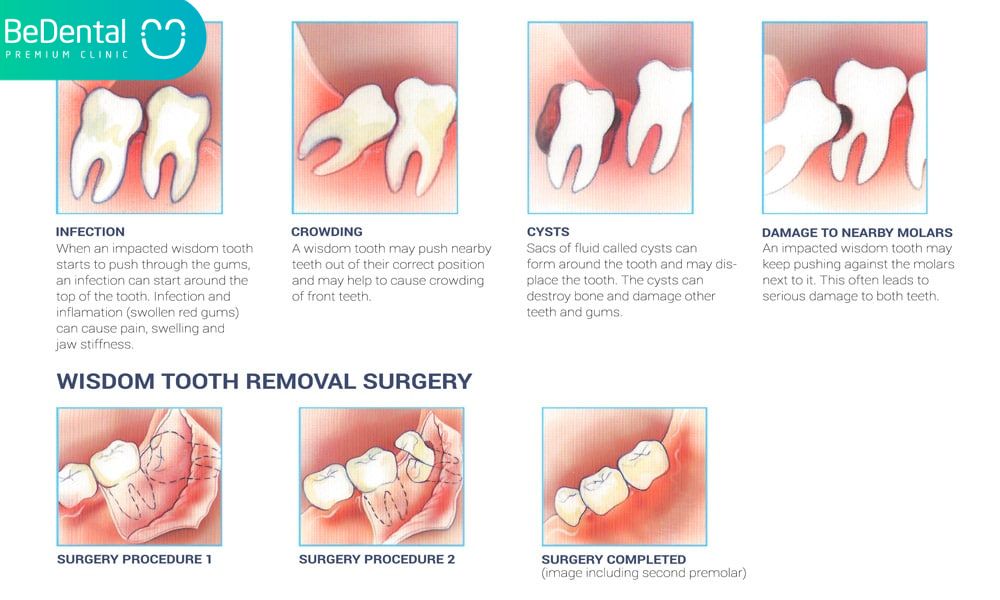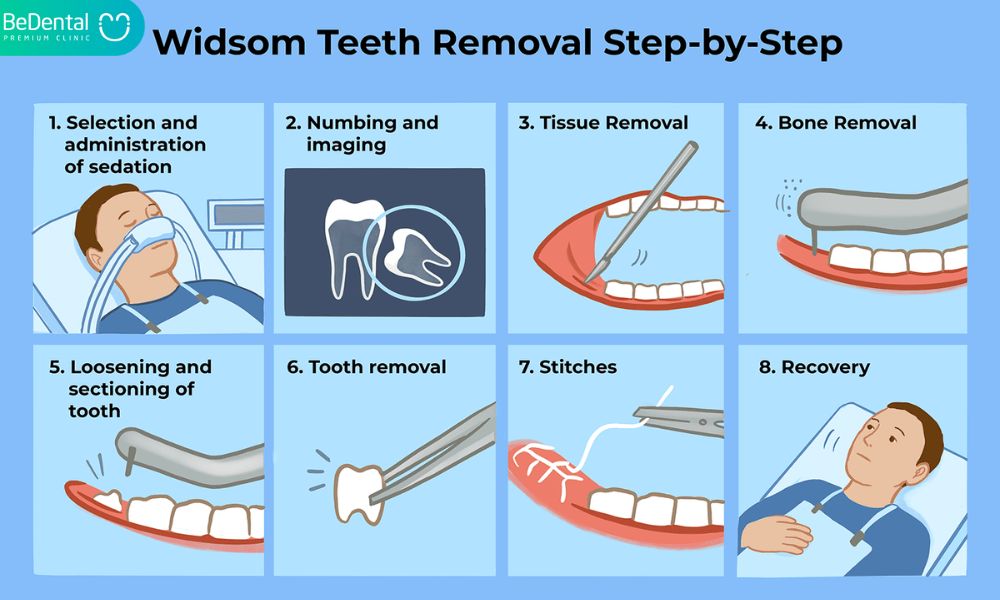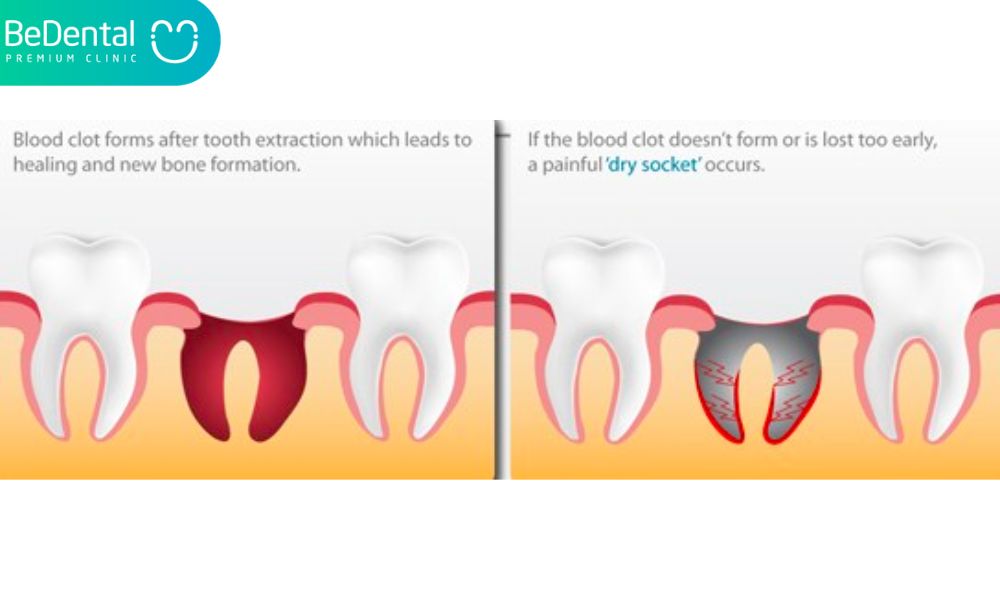Dental Knowledge, Kiến Thức Nha Khoa
Wisdom tooth removal: 4 things you must know
The four permanent adult teeth known as wisdom teeth are positioned at the top and bottom rear corners of your mouth. One or more wisdom teeth may be surgically removed during this surgery.
Why is wisdom tooth removal needed?
The final permanent teeth that emerge (appear) in the mouth are wisdom teeth, also referred to as third molars. Between the ages of 17 and 25, these teeth normally develop. Some individuals never develop wisdom teeth. Some have wisdom teeth that emerge naturally, exactly like their other molars, and create no complications.
Wisdom teeth that are impacted, or those that lack enough space to erupt or grow correctly, are common. Impacted wisdom teeth may partially or completely fail to emerge.
An impacted wisdom tooth may:
- Grow at an angle toward the next tooth (second molar)
- Grow at an angle toward the back of the mouth
- Grow at a right angle to the other teeth, as if the wisdom tooth is “lying down” within the jawbone
- Grow straight up or down like other teeth but stay trapped within the jawbone

Problems with impacted wisdom teeth
You’ll likely need your impacted wisdom tooth removal if it results in problems such as:
- Pain
- Trapping food and debris behind the wisdom tooth
- Infection or gum disease (periodontal disease)
- Tooth decay in a partially erupted wisdom tooth
- Damage to a nearby tooth or surrounding bone
- Development of a fluid-filled sac (cyst) around the wisdom tooth
- Complications with orthodontic treatments to straighten other teeth
Preventing future dental problems
The efficacy of removing impacted wisdom teeth that aren’t creating issues is debatable among dental specialists (asymptomatic).
It is challenging to detect potential issues with impacted wisdom teeth. So here is the justification for preemptive extraction:
- Symptom-free wisdom teeth could still harbor disease.
- If there isn’t enough space for the tooth to erupt, it’s often hard to get to it and clean it properly.
- Serious complications with wisdom teeth happen less often in younger adults.
- Older adults may experience difficulty with surgery and complications after surgery.
Risks
The majority of wisdom teeth removals don’t have long-term problems. Yet, sometimes a surgical procedure that involves creating an incision in the gum tissue and bone excision is necessary to remove an impacted wisdom tooth. Rare problems may arise from:
- When the postoperative blood clot is lost from the site of the surgical wound, a painful dry socket or exposed bone results (socket).
- Infection in the socket from bacteria or trapped food particles
- Damage to nearby teeth, nerves, jawbone or sinuses
A dentist or a qualified surgeon working in a hospital can remove a wisdom tooth.
In the event that your dentist advises having your wisdom teeth removed, they will take an X-ray of your mouth to identify who should do the treatment.
Before the operation starts, all fees and payment options should be negotiated. Get more information about BeDental’s price list.
Anesthesia
You will receive a local anesthetic injection to make the tooth and surrounding region numb prior to having your wisdom teeth removed.
Your dentist or surgeon may give you a sedative to help you relax if you are particularly anxious about having the surgery done. Often, an injection is used to achieve this in your arm.
Rarely is a general anesthesia used for wisdom teeth removal. When the surgery is carried out in a hospital, it is only ever employed on very rare instances. In this situation, though, you should be allowed to go home the same day as the treatment.
Wisdom tooth removal

If the tooth hasn’t already pierced the gum, a little incision will be created there to provide access. The tooth’s surrounding bone may also require a minor amount of removal.
It is possible to break the tooth into tiny pieces to make it simpler to remove it via the hole. It is not as necessary to make an incision if the tooth has already burst through the gum.
Because your dentist or oral surgeon will need to enlarge the tooth socket by rotating the tooth back and forth before extracting it, you could feel some pressure shortly before the tooth is removed.
Because the region will be numb, you should not feel any discomfort when your wisdom teeth are pulled. To ensure that sufficient anesthesia is given, let your dentist or oral surgeon know if you suffer any discomfort throughout the treatment.
The tooth extraction procedure might take a while. Easy tasks can be completed in a few minutes, but more difficult tasks might take up to 20 minutes.
After surgery
Dissolving stitches are used to seal any incisions that are created. Your dentist will tell you how long it will take for the stitches to dissolve (usually 7 to 10 days).
Your dentist may place gauze over the extraction site and give you instructions to bite your jaws together for up to an hour in order to apply pressure to it. In order to facilitate the development of a blood clot in the empty tooth socket, this is done. Avoid disturbing blood clots because they are a typical component of the healing process.

If you have an ongoing infection, antibiotics may occasionally be advised.
Anesthesia has diverse effects on different people. In order to start your recuperation, you might be allowed to drive home if you get a local anesthetic and feel awake. You might even be able to resume your regular activities or return to work. You will require a driver to take you home if you are under general anesthesia or still feel sleepy.
The majority of patients have little to no discomfort after surgery. You will most likely have swelling and little discomfort for the next three days or so. Your mouth may need a few weeks to fully recover.
For a speedier recovery, adhere to your doctor’s recommendations. The following advice is for the first three days following surgery:
Do:
- Use an ice pack on your face to curb swelling or skin color changes.
- Use moist heat for a sore jaw.
- Gently open and close your mouth to exercise your jaw.
- Eat soft foods like pasta, rice, or soup.
- Drink plenty of fluids.
- Brush your teeth starting the second day. Don’t brush against any blood clots.
- Take the drugs your doctor prescribes to ease pain or swelling.
- Call your doctor if you have a fever, or if your pain or swelling doesn’t improve.
Don’t:
- Don’t drink through a straw. Sucking may loosen blood clots that help your mouth heal.
- Don’t rinse your mouth too harshly. Your doctor may suggest rinsing gently with saltwater.
- Don’t eat hard, crunchy, or sticky foods that may scratch your wounds.
- Don’t smoke. Smoking can slow your healing.
More
Chipped tooth: Causes, Symptoms and 4 ways to Handle
Wisdom Teeth and 4 Typical Symptoms
Water flossers: The 8 best water flossers of 2023
Coffee In Moderation and Its Dental Effects







Pingback: Best Dental Clinics Near Me in Hanoi | Nha Khoa Bedental
Pingback: What should I do if I lose Tooth Number 7 in the upper or lower jaw? – Be Dental